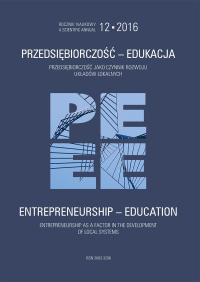The Concept of Assessment and Development of Entrepreneurial Attitudes Based on Instruments Developed within the Framework of the Project RLG
DOI:
https://doi.org/10.24917/20833296.12.32Keywords:
diagnoza kompetencji, inicjatywność, kompetencje biznesowe, kompetencje kluczowe, kompetencje osobiste, kompetencje przedsiębiorcze, kompetencje społeczne, przedsiębiorczośćAbstract
The level of youth unemployment in Europe (15-24 years) in 2014 was 23%, and in some countries (Spain, Greece) approached 50%. On average, the youth unemployment rate in the EU is two times higher than for adults, affecting over 5 million young people. The greatest risk of unemployment occurs among people with low education and low skills. The response to the economic situation of young people is an international project financed with EU funds “Reaching the Lost Generation” (the Erasmus Program Plus, Action 2 - Cooperation for innovation and good practices - Transnational strategic partnerships, addressed to young adults who do not have jobs, and its main task is to develop entrepreneurial competencies among these people to give them a better chance to enter the labor market. The aim of this article is to identify the key competencies in entrepreneurship for young people appearing before the ne cessity of choosing the further path of education or entering the labor market as well as to review selected tools elaborated to develop these competencies based on the project “Reaching the Lost Generation”. The project is implemented jointly with partners from Hungary (Foundation EDUNET), Germany (Euro Training Centre) and the UK (Train’ d Up). The article identified 10 core competencies that can be used to study the development of key competency of students, who are on the verge of entering the labor market, defined in EU as “sense of initiative and entrepreneurship”. It also presents the tools necessary to determine the level of development of these competencies among students (during assessment day) consisting of developed exercises, observation sheets and self-assessment forms. Preliminary results of the project showed a great diversity of competencies among students. The next stage of the project will be conducting workshops aimed at developing the entrepreneurial competencies on the basis of exercises developed by the project partners, divided into categories according to specific competencies. Based on educational materials for exercises, developed by the project partners, it is possible to develop this key competence, is divided into different categories.References
Eurostat (2015a). Being young in Europe today. Theme: Population and social conditions. Collection: Statistical books, European Union.
Eurostat (2015b, 13 listopada). Unemployment rates by sex, age and educational attainment level (%) [lfsa_urgaed]. European Union. Pozyskano z: http://ec.europa.eu/eurostat/web/lfs/data/database
Eurostat (2015c, 13 listopada). Unemployment rate by sex and age groups - annual average, % [une_ rt_a], European Union. Pozyskano http://ec.europa.eu/eurostat/web/lfs/data/database
GUS (2015). Sytuacja na rynku pracy osób młodych. Ministerstwo Pracy i Polityki Społecznej, Departament Rynku Pracy, Wydział Analiz i Statystyki.
Kompetencje kluczowe w uczeniu się przez całe życie. Europejskie Ramy Odniesienia (2007). Urząd Oficjalnych Publikacji Wspólnot Europejskich, Luxembourg.
Kwiatkowska, H. (2008). Pedeutologia. Warszawa: Wydawnictwa Akademickie i Profesjonalne.
Płaziak, M., Szymańska, A.I. (2014). Otwartość na innowacje jako przejaw przedsiębiorczości ludzi młodych na przykładzie studentów uczelni krakowskich, Horyzonty Wychowania, 13(26), 267–286.
Płaziak, M., Szymańska, A.I. (2015). Uwarunkowania działalności przedsiębiorców i rolników na placach targowych na przykładzie Nowej Huty. Przedsiębiorczość – Edukacja, 11, 203–217.
Pirog, D. (2015). Kompetencje z zakresu przedsiębiorczości: rozważania teoretyczne i ich ilustracje w obszarze szkolnictwa wyższego. Przedsiębiorczość – Edukacja, 11, 364–376.
Rachwał, T. (2005). Kształtowanie postaw u uczniów na lekcjach przedsiębiorczości. Przedsiębiorczość – Edukacja, 1, 137–144.
Rachwał, T., Kurek, S., Boguś, M. (2016). Entrepreneurship Education at Secondary Level in Transition Economies: A Case of Poland. Entrepreneurial Business and Economics Review, 4(1), 61–81. DOI: http://dx.doi.org/10.15678/EBER.2016.040105
Świłło, I. (2012). Jestem przedsiębiorczy – kształtowanie postaw przedsiębiorczych wśród młodzieży z wykorzystaniem innowacyjnych technik i narzędzi. Prezentacja projektu. Przedsiębiorczość – Edukacja, 8, 71–77.
Osuch, W. (2011). Kompetencje w zakresie komunikacji interpersonalnej w dobie postępujących procesów globalizacji. Przedsiębiorczość – Edukacja, 7, 333–346.
Downloads
Published
How to Cite
Issue
Section
License
Articles are published under the terms of the Creative Commons License (CC BY-ND 4.0; Attribution– NoDerivs).

